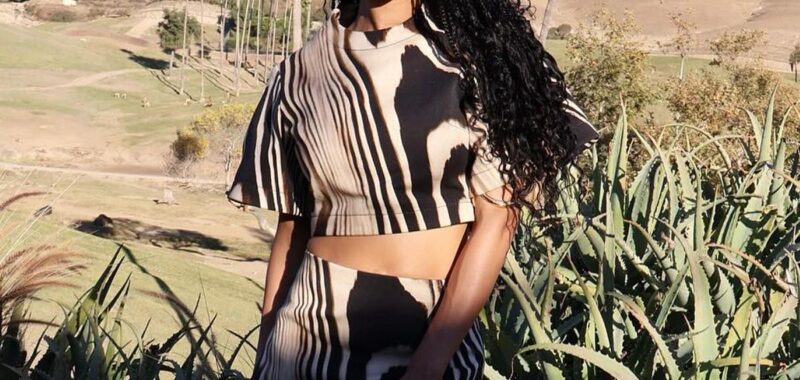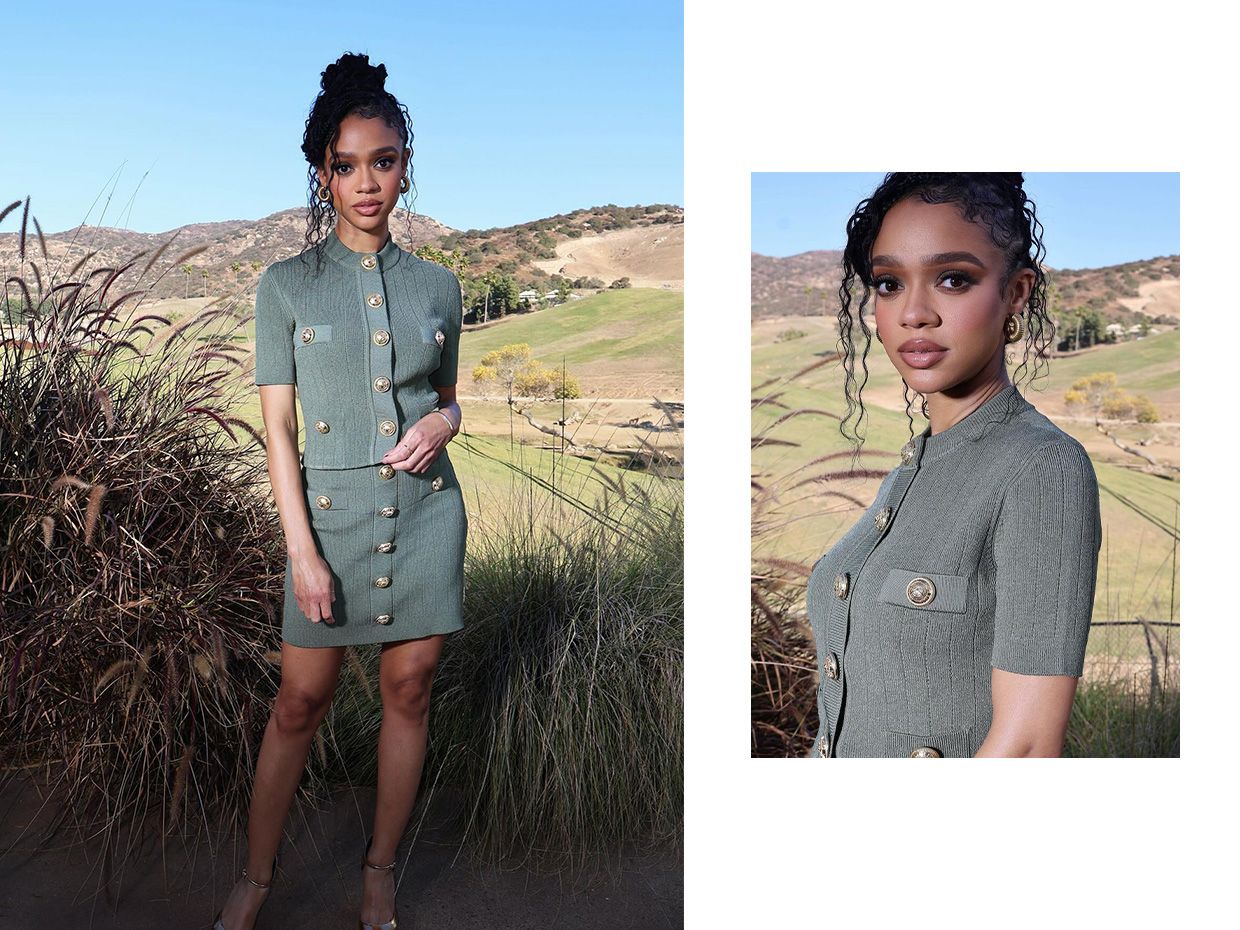
When actor Tiffany Boone went into her first fitting for the Mufasa: The Lion King press tour, Africa and her character Sarabi were top of mind. She wanted lots of color and bold patterns—a nod to the film’s setting—and for the looks to embody the feminine, joyful, and regal characteristics of the iconic Disney lioness. It was a moment for her and stylist Amanda Lim to pull out all the stops. After all, Boone spent months filming Mufasa in a recording booth wearing sweats. The red carpet needed to be a stark contrast, and boy, did she deliver.
For the Los Angeles premiere, Boone selected a striking number from the Disney x Balmain: The Lion King collection, a curated selection of ready-to-wear pieces and accessories designed by the brand’s creative director Olivier Rousteing. The strapless, corseted column gown, which she paired with Irene Neuwirth jewels and Christian Louboutin heels, features fringe embroidery of multicolored glass beads, creating a vibrant zebra-inspired motif. Two days later, she turned up for a photo-call in a custom Balmain gown emblazoned with a beaded lion head and attended the film’s UK premiere wearing a jaw-dropping blue-and-black tiered Mithridate gown.
Boone is no stranger to playing strong women who more than hold their own in male-dominated environments (see also: Hunters and The Big Cigar), but she is still pinching herself at the thought of being a part of a Disney film, let alone an IP that meant so much to her growing up. Directed by Barry Jenkins, Mufasa: The Lion King is an origin story that tells the unlikely rise of the beloved king of the Pride Lands as young Mufasa, Taka/Scar, and Sarabi set out on an epic adventure of finding themselves.
We caught up with Boone last month to talk about making her Disney dreams come true, tapping into a childlike imagination to voice Sarabi, and overcoming her singing fears for the film.
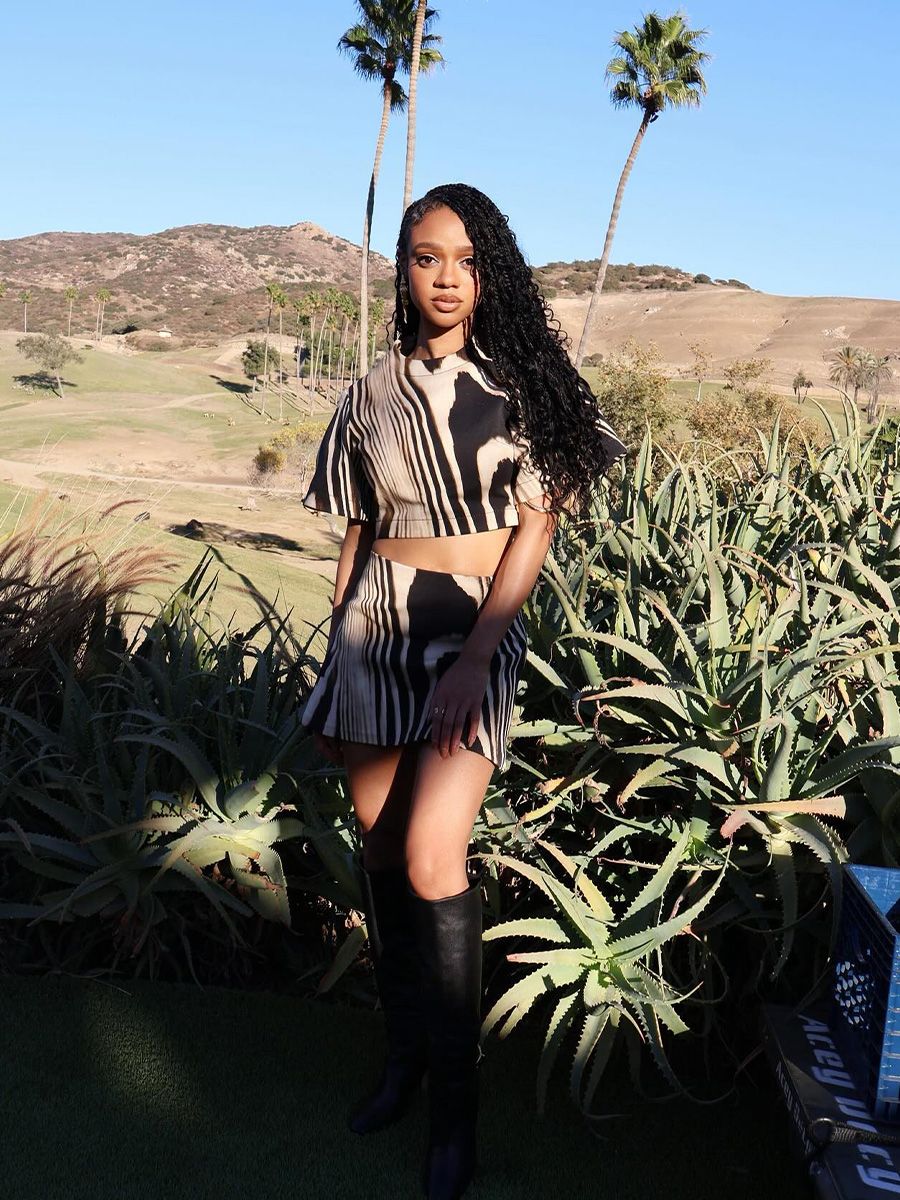
(Image credit: Photo and hair: India Hammond; Makeup: Nadia Moham; Styling: Amanda Lim.)
What was your relationship to The Lion King film growing up?
It meant a lot to me, actually. I really connected to the character of Simba. My father passed away when I was 3, and [the release of the movie] would have been a couple of years after he passed. To see on film this character who loses his father and then going through this transformation of grief and learning to love life again and returning home, it just gave me… It was one of the times where, weirdly enough, I felt like I was seeing myself on film and seeing a life where it still could be filled with joy and family and hope, so it meant an incredible amount to me.
How did being a part of Mufasa: The Lion King come about, and what excited you about this particular story within the Lion King franchise?
When it came my way, I had quit doing voice-over auditions for some years because I was like, “I’m not good at it. I don’t like it. I never book anything. I just need to get away from it.” Randomly, they sent this, and I was like, “Well, on second thought, let me come back” without ever imagining that I would book it, but I couldn’t say no to the possibility. I got very little information. I just got sides, and I didn’t even know I was auditioning for Sarabi. It was a different character’s name. It just excited me to be part of the legacy, and then once I found out I was playing Sarabi, I was like, “What?! That’s amazing!” To find out that it was a prequel and origin story, it was so exciting to me because I love these characters, and you don’t know, loving The Lion King all these years, How did Scar become Scar? How did Mufasa become Mufasa? How did Sarabi become Sarabi? You don’t know how they got to that place [we find them in the original film], so to me, it was exciting to be able to find out for myself but also to introduce to the world the backstory of these amazing characters.
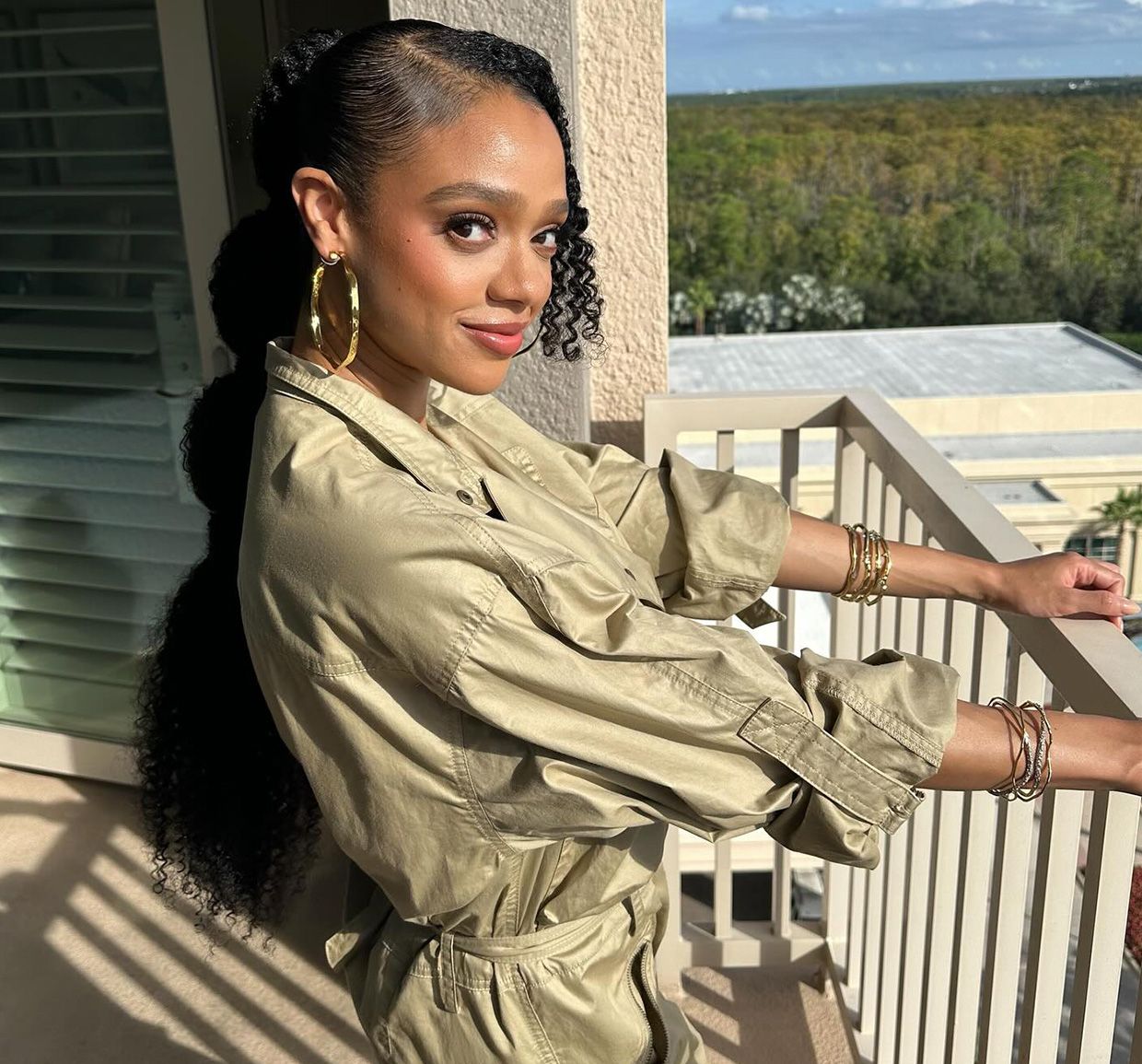
(Image credit: Photo and hair: India Hammond; Makeup: Tyra Israel; Styling: Shameela Hicks.)
You have Barry Jenkins directing, which I imagine was another exciting element. What were some of the early conversations you had with him about his vision for the film and the character of young Sarabi?
It was so long ago. Sometimes, I forget about this process because it’s been three years. I remember actually being in this room [I’m in now] and Zooming with Barry, and it was his first foray into the medium as well. He was like, “We’re all figuring this out together, but I want to preserve the fun and adventure and the joy of the original but bring some real depth to it as well as these themes of family and home.”
As far as Sarabi, he was like, “I don’t need you to copy what the previous actors did before you. We’re showing how we got to this place where we meet Sarabi, but you get to explore what her voice would have been like when she was younger. … We’re just going to play, and we’re going to have a lot of fun.” That’s what we did for three years—play.
Tell me about finding her voice and making that your own.
When I auditioned, I didn’t know who the character was. It probably would have changed how I came at it. If I had known, it probably would have put more pressure on it. But from reading the script, I felt she was youthful, independent, kind of feisty, and it felt pretty close to my own voice. I felt very connected to her as a character, so for me, it was about finding the strength in the voice but also allowing the vulnerability. Once I knew I was playing Sarabi, to tie in those performances that we know so well, there’s just such a regalness to [them], so it was like, “Okay, how do I still have that sense while still being a youthful voice?” That’s how I approached it.
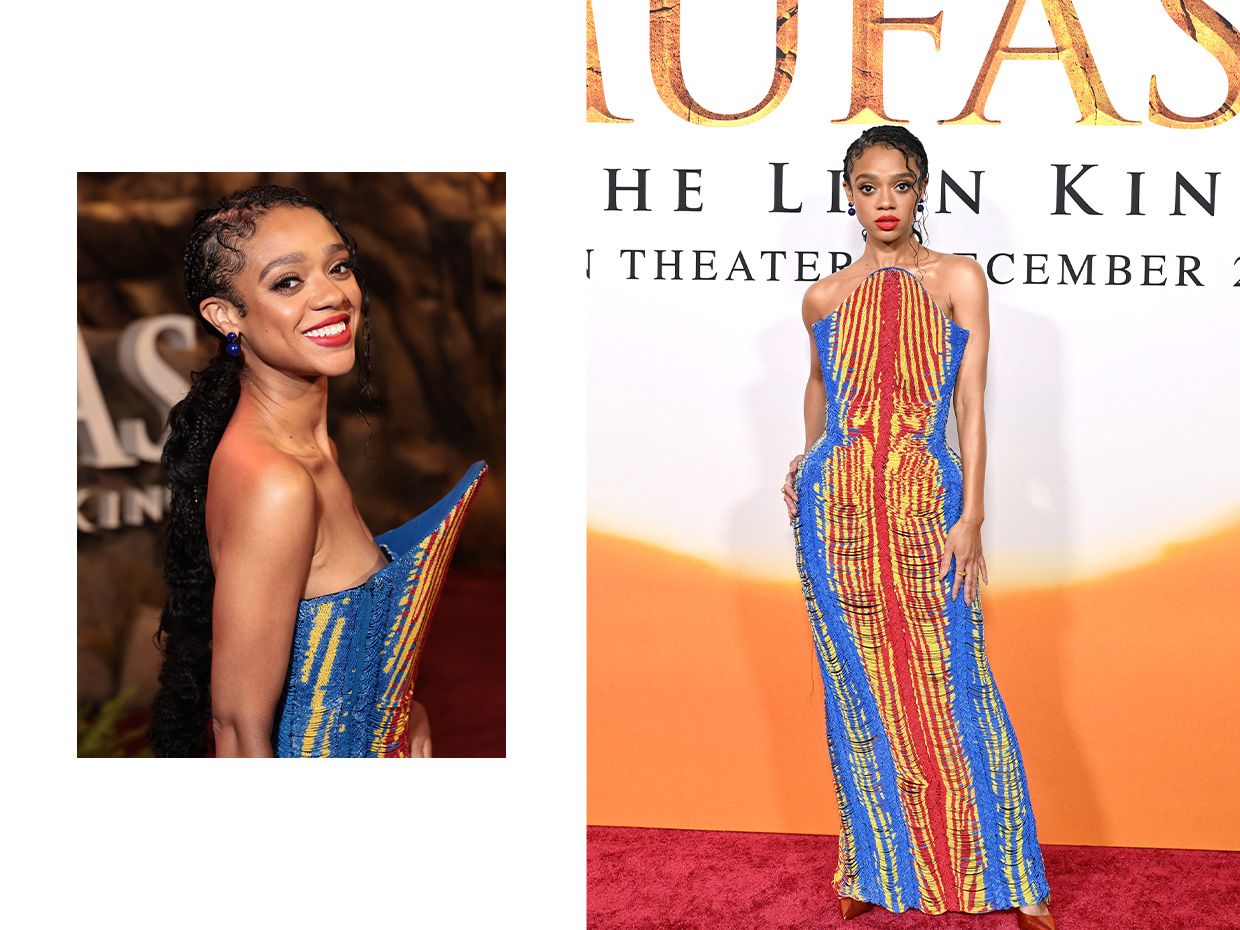
(Image credit: Getty Images. Wardrobe: Balmain gown; Irene Neuwirth jewelry, and Christian Louboutin heels. Hair: India Hammond; Makeup: Nadia Moham; Styling: Amanda Lim.)
This is your first voice role. How did that challenge a different acting muscle for you? What did you really enjoy about it?
I think the challenge going in for me and I think why I quit doing it… I don’t think I was coming at it from a full imagination. Doing voice-over, you have to be in full child mode. Children can just see everything and go into a different world in a second without having anything in front of them, and that’s how you have to be. You have to be childlike in voice-over work. Working with my voice-over coach, she helped me to really get in my body and really make crazy faces and purr like a lion—stuff I would never do in my normal work. If you are doing TV and film, there has to be subtlety there. There’s no subtlety in voice-over. Subtlety does not work. You have to go full-on, so I’m taking my shoes off, and I’m in the booth jumping and screaming and doing all of that kind of stuff. It was scary for me, but it wound up being so fun because it’s really freeing when no one can see how stupid you look. Even though they had cameras around us all the time, I like to pretend that nobody can see it. I only got to be in the room a few times working with Kelvin [Harrison Jr., who plays Taka], but we would be across the room from each other. It’s such a different experience than being face-to-face with another actor. You are really just going off of what you hear. It’s really fun but definitely a different muscle.
Have you seen any of the videos of you in the booth?
I saw a little bit. I was like, “I probably should have looked a little better” because I did think sometimes, Is someone going to see this? I should have maybe put on a lash or something.
It’s also nice that you can just walk in and be comfortable.
One-hundred percent. I totally took advantage of it. I would just show up in sweats every day and a bandana over my hair and no earrings because they make sound. No jewelry, no nothing—just fully present and not worried about how you look, which is really nice. But it’s also nice now to be starting the press tour and getting to dress up. It’s a sharp contrast when people see behind the scenes from what I’m going to look like on the red carpet.
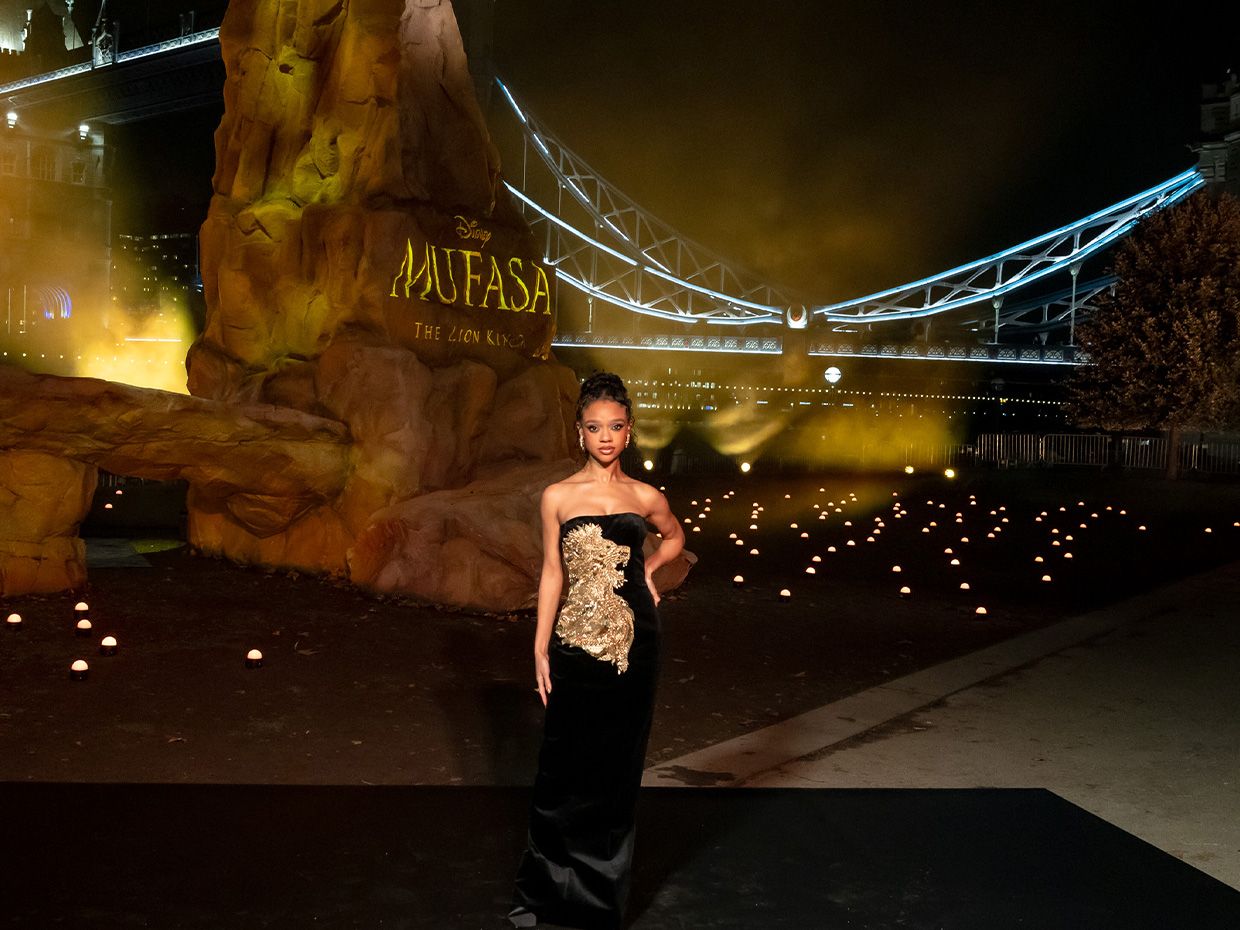
(Image credit: Disney. Wardrobe: Custom Balmain gown; Judith Lieber bag; Amina Muaddi heels. Hair: India Hammond; Makeup: Nadia Moham; Styling: Amanda Lim.)
With this film, we’re getting to see Sarabi’s backstory. Can you talk a little about who this lioness is?
I can’t say much, of course. When we see her in the previous films, the original, to me, she just always seems so perfect—the perfect mother, the perfect wife, just so regal. What I think is interesting that you’re going to get to see in this film is the complexity of her. She’s not perfect. How she got to be this great queen, it took a lot of challenges, and she finds herself, as we all do. First of all, no one is perfect, but you’re definitely not just born understanding everything being this great, wise person. You get to see how she became this beloved character and how she became one of the greatest mothers and wives of the Disney canon.
Lin-Manuel Miranda wrote the music for the film. How was it for you having to sing for this project?
It was another big challenge for me. I have a phobia of singing in front of people. I’ve had it since I was probably in middle school. I wanted to be a singer growing up, and I used to write songs and perform and stuff, and then one day, my mother told me that people were laughing at me and I couldn’t sing, so I stopped. Trauma. Coming onto this, when I started auditioning, nobody mentioned singing, so I was like, “Oh cool, [Sarabi] doesn’t sing. Perfect.” In my last audition, they were like, “Yeah no, we need her to sing.” So I had to really confront my fears there, which honestly took some therapy and an amazing vocal coach and working together for months and months. I’m now really thankful that I had that experience because it really pushed me out of my comfort zone, and I faced some things that were really uncomfortable for me. Now, I can listen to the songs and not hate the sound of my voice, which is insane to me. When I found out that it was Lin who was writing the songs, which was a couple years in when I found that out, I was like, “Are you serious?! This is so amazing!” It’s really special to be in a Disney film [and] be in The Lion King and have songs that I sing. My mind is still blown that I’m even doing this.
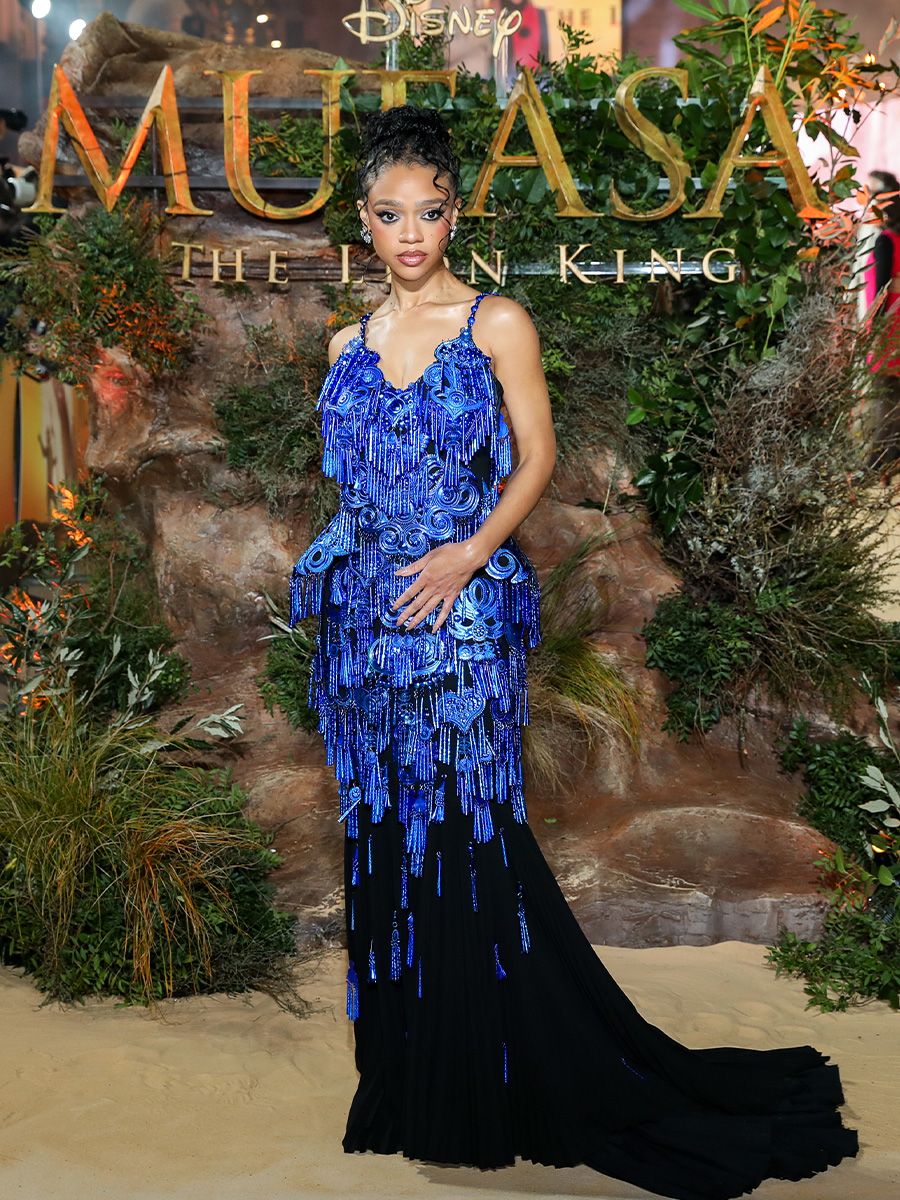
(Image credit: Disney. Wardrobe: Mithridate gown; Amina Muaddi heels. Hair: India Hammond; Makeup: Nadia Moham; Styling: Amanda Lim.)
The Lion King had many takeaways for the viewer, including themes of accepting responsibility and embracing one’s true identity. What would you say are some of the key messages of Mufasa?
It’s really about family. It’s about brotherhood, and it’s about community. It’s about finding your place in the circle of life and that if we do things as a community and come together, it’s much easier than trying to be by ourselves. I think we have a very individualistic society that we are living in right now, and I think Barry is trying to make some points here—the importance of community and how much we can overcome if we do things together rather than apart.
We have to talk about the press tour for the film and what you’ll be wearing. You mentioned it’s going to be a stark contrast from your booth style. How will you be paying homage to Sarabi with your looks?
I just had my first fitting for all of this a couple of days ago, and I was really clear that I wanted to bring in… It’s a movie set on the continent of Africa, and I want bright colors, I want pattern, [and] I want things that feel joyful and light. She’s a Disney queen, a Disney princess at this point, so I want to feel like a princess. I want things that feel grand and youthful—all the things that I think this character is, bold and feminine. Those are the things that we are trying to bring to the press tour.
Mufasa: The Lion King is in theaters December 20.

